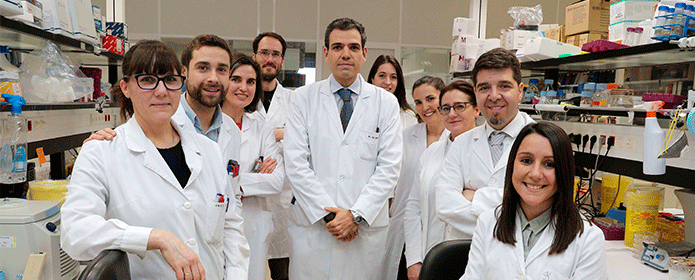Blockade of a gene is found to halt lung cancer progression
Researchers from Clínica Universidad de Navarra and Cima reveal that inhibition of the Id1 gene in individuals with the KRAS mutation also manages to curb the possibility of metastasis.

A research of Clínica Universidad de Navarra y Cima has shown that blocking a protein (Id1) can slow lung cancer in patients with the KRAS gene mutation, who account for 30% of all patients with this tumor. The study, published in the journal Cancer Research, offers hope for the treatment of this subtype of lung cancer, which is usually more aggressive and less responsive to treatment, as it boosts the search for new drug therapies for these patients.
"KRAS is the oncogene that most frequently causes the appearance of various types of tumors, such as lung cancer, and for which, however, we do not currently have a personalized treatment. Hence, the enormous relevance of investigating therapeutic options directed against this mutation, which until now has been an orphan of therapeutic options in the field of precision medicine", acknowledges Dr. Ignacio Gil Bazo, co-director of department of Medical Oncology at Clínica Universidad de Navarra and one of the principal investigators of this study.
In this search for treatments, the researchers at the Clinic and Cima have discovered that by targeting the factors through which the KRAS mutation exerts its pro-tumor action, they can slow tumor progression and the possibility of metastasis. development To do this, it is necessary to inhibit Id1, a gene that this team had already demonstrated "that confers a series of advantageous properties for tumor growth and also favors tumor angiogenesis (vascular growth) and metastasis".
By blocking the action of this protein, the tumor cannot progress, even though the KRAS mutation does not disappear. "Strategies that act directly on KRAS have not been able to reach the patient, either because they are ineffective or because of their high toxicity, which is why this new strategy that acts on the factors that make it possible for it to act is relevant. If we prevent KRAS from acting, although it is still there, it does not develop its pro-tumorigenic capacity", adds Dr. Silvestre Vicent, researcher of the Solid Tumors Program at Cima , who also co-led this study.
A long researchThis new scientific article brings together two lines of research that have been developed in parallel, one at the Clinic and the other at Cima. On the one hand, the line led by Dr. Silvestre Vicent has focused on lung tumors derived from the KRAS oncogene and how it acts on the tumor. The second study, led by Dr. Gil Bazo, has investigated the Id1 gene and its impact on tumor growth and the appearance of metastasis.
"By pooling the preliminary work of both groups, we saw that there was probably an interaction between the factors studied in each laboratory that opened up the opportunity to develop a joint research and thus unravel the involvement of Id1 in all those harmful oncogenic properties generated by KRAS in patients with lung adenocarcinoma. And that is what we have demonstrated in this article", recognizes Dr. Marta Román, first author of the work and who is developing her thesis doctoral work in this field at Dr. Gil Bazo's laboratory .
Until then, Dr. Vicent's group had demonstrated the existence of a series of factors that give patients with KRAS mutations in their tumor a worse prognosis and a poor response to treatments. The mutated KRAS gene and the FOSL1 gene converged in them. With this new study they have shown that the link between the two is the Id1 gene. "We have seen that when we are able to block the action of Id1, both in the tumor cell and in the tumor microenvironment where the cell is implanted, tumor growth is halted and even prevented," says Dr. Román.
"Lung cancer is the tumor with the highest number of patients diagnosed and the highest number of patients who die each year. This study represents a paradigm shift that allows us to continue advancing and researching in the pharmacological design inhibitors against this tumor", conclude Dr. Vicent and Dr. Gil Bazo.
